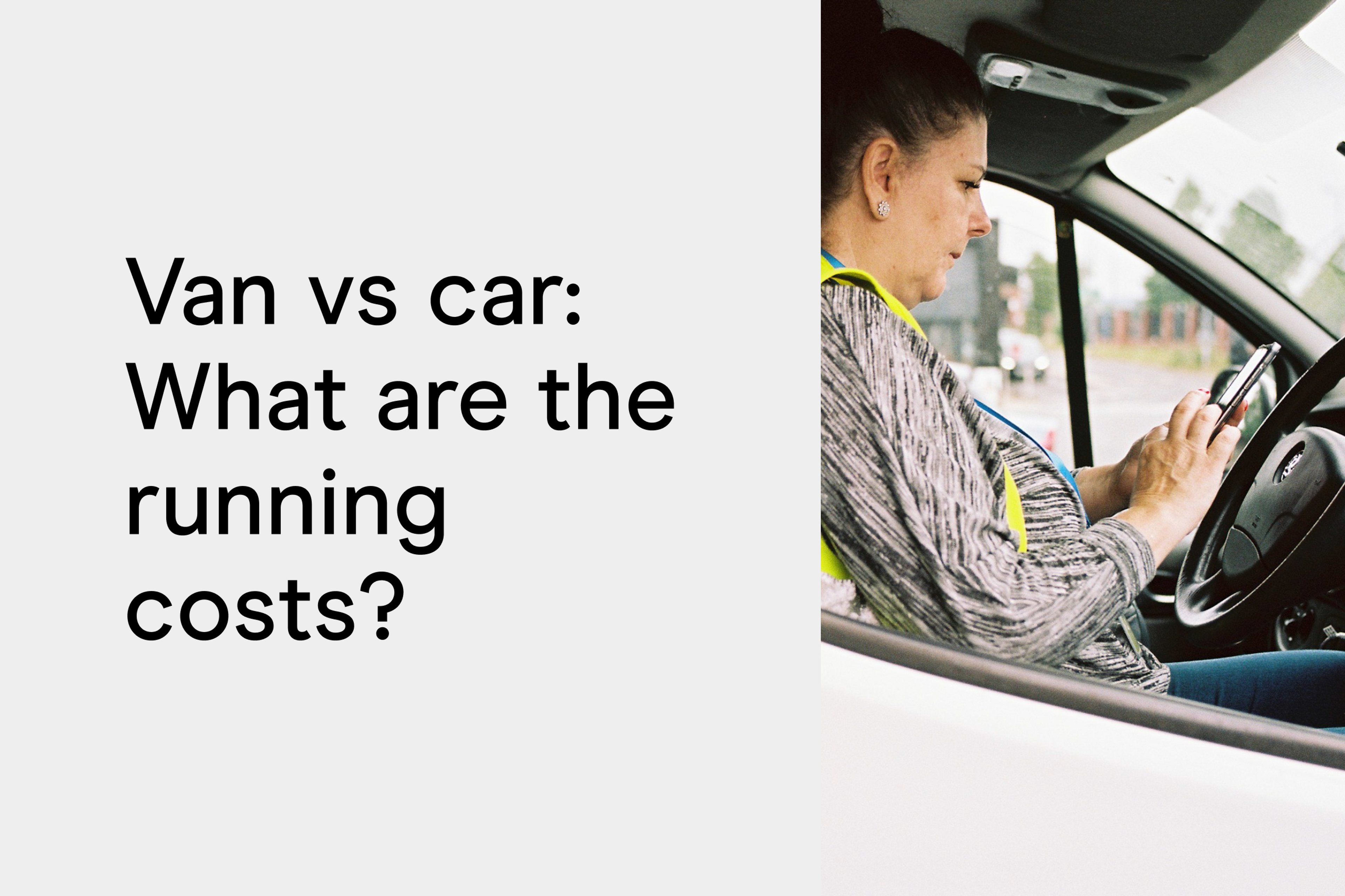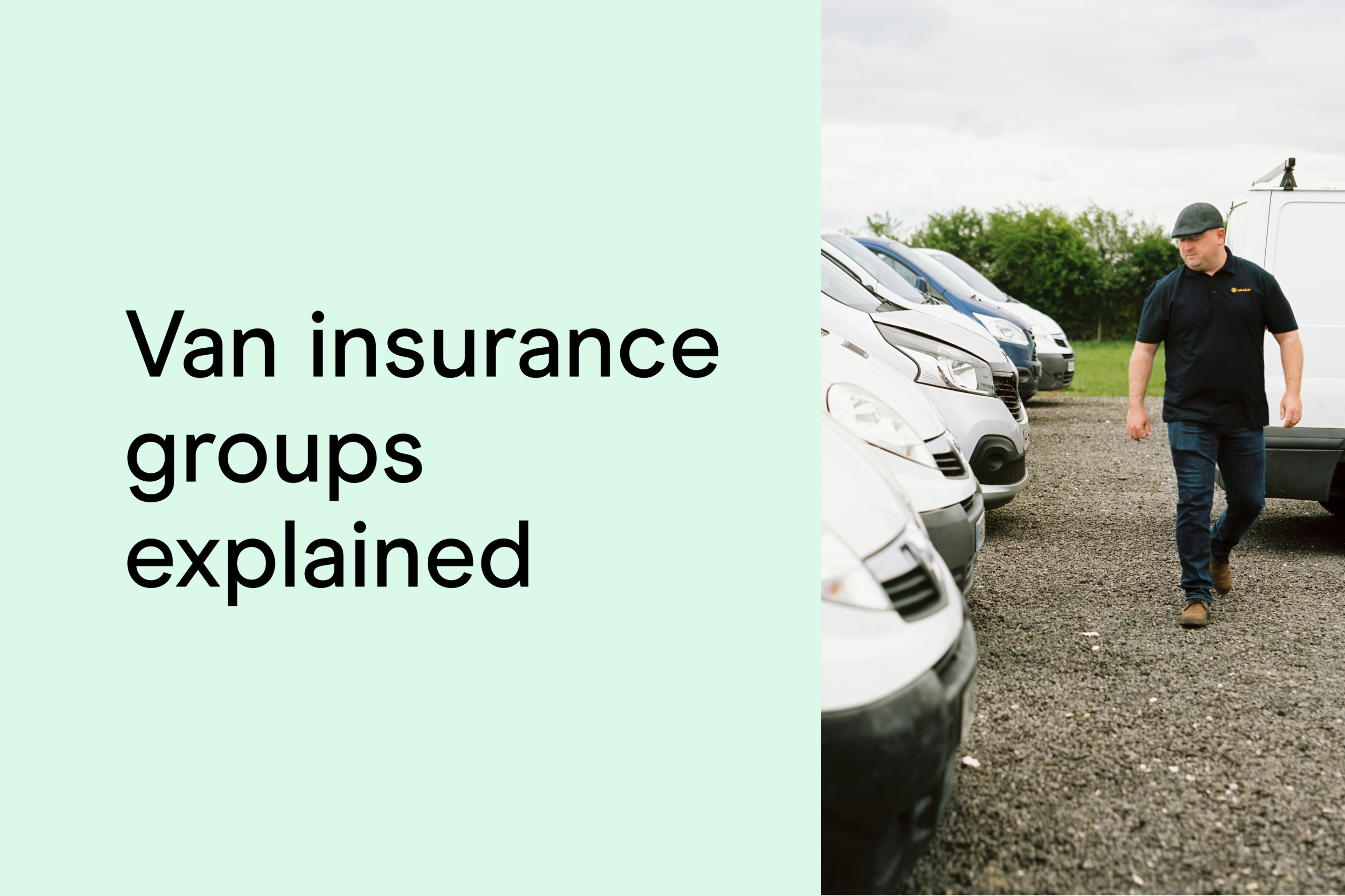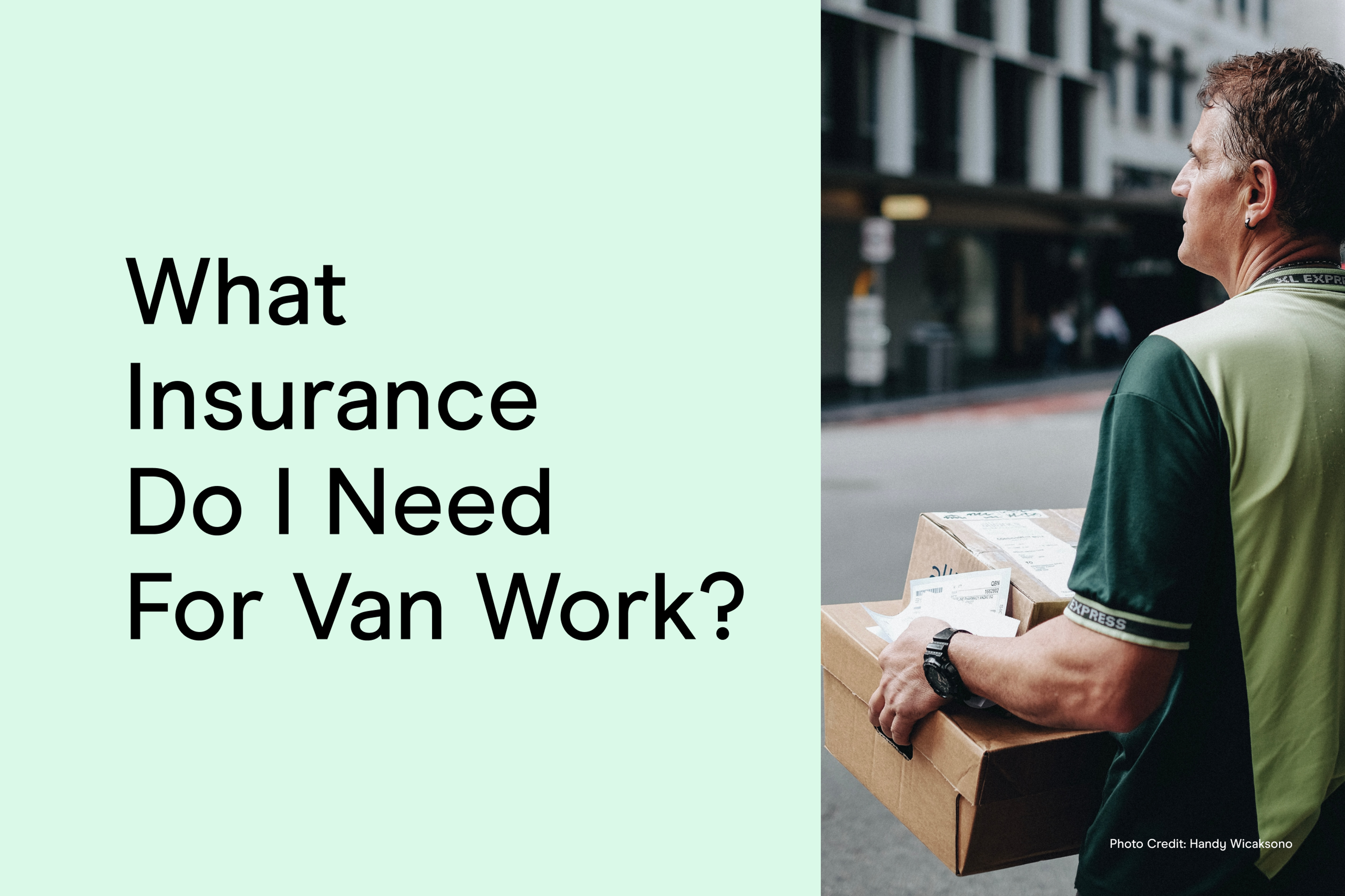If you’re using a van for work or your business, you’ll need the right insurance. With so many options available, it can be difficult to choose a van insurance policy that gives you the protection you need at an affordable price.
In this comprehensive guide, we’ll uncover everything you need to know about van insurance, and help you to find a policy that’s tailored to you.
What is van insurance?
Van insurance protects you and your van against any damage, losses or liabilities. It covers damage to your own vehicle, as well as injuries or damage caused to others while driving.
Unlike regular car insurance, van insurance is designed for vehicles used for commercial driving, such as delivery work, transportation, trades and mobile businesses.
Who needs van insurance?
Anyone who drives a van for work or business use is legally required to have van insurance, even if they only use the van part-time or occasionally. This includes sole traders, delivery drivers, self-employed tradespeople, small business owners, and charities operating vans.
Personal car insurance policies will not cover you for driving a commercial vehicle for business use. Without the right van insurance, you could end up losing a lot of money, and face serious penalties or prosecution.
Types of van insurance policies
When searching for the right type of van insurance , you'll come across three main types of policies:
Third party only
This covers you financially for any damage or injuries you cause to others, but it doesn’t cover you or your van. This type of policy provides the legal minimum cover to drive in the UK, but it can leave your vehicle unprotected.
Third party, fire and theft
Along with the protection offered by basic third party insurance, this policy also covers you for loss or damage to your van caused by fire or theft.
Comprehensive
This is the highest level of cover you can get. It provides insurance for third party liability along with damage to your own vehicle caused by accidents, vandalism, weather events and more. This type of policy is usually recommended for self-employed drivers or business owners as it offers complete protection and peace of mind.
Things that can affect van insurance costs
The cost of van insurance can vary depending on things like:
- Type of van – The make, model, value, age and engine size of your van can all affect how much you pay for insurance.
- How the van is used – Things like your estimated annual mileage, where you park it at night, the goods you’ll be carrying and the type of work you do.
- Driver details – Your age, driving experience, claims history and convicted driving offences.
- Security features – Alarms, immobilisers and tracking devices can help to lower your insurance premiums.
- Voluntary excess – If your policy allows it, you might be able to choose a higher excess amount to reduce your monthly payments.
How to get cheaper van insurance
Finding cheaper van insurance requires a bit of research and planning. Start by getting quotes from multiple providers using comparison sites. Look for policies that match how you specifically use your van. Choosing a higher voluntary excess, if you can, is another way to lower your premium, as long as you can afford to pay that amount if a claim arises.
Parking your van in a garage or private driveway overnight can help to reduce the risk of theft and vandalism. This makes you seem like a lower risk to insurers, potentially resulting in cheaper quotes. Keeping a clean claims history also shows that you’re a safe driver, so try to build up your no claims discount each year you drive.
Paying annually in one lump sum can save you money compared to paying monthly. Also, taking advanced driving courses (like PassPlus) signals to insurers that you’re committed to being a safe, responsible driver.
Finally, adding security features like alarms and immobilisers can make your van less appealing to thieves, which can help to lower your insurance costs.
How to get the right level of cover
When choosing van insurance, start by assessing the total value of your van and any tools or equipment you regularly carry in it. Make sure the cover you get is enough to fully repair or replace your van and those goods. Also make sure you’re covered for potential legal liabilities – things like third party cover in case an accident leads to injury or loss for others.
If you use your van for work or business reasons, make sure your insurance covers you for the type of work you do, including driving to various locations. Check what’s excluded from the policy, and consider choosing add-ons if you need to fill any gaps.
Adding named drivers makes sure that anyone else who drives the van is properly covered. And couriers or delivery businesses should look into hire & reward insurance to make sure they’re covered while carrying out deliveries.
Taking the time to find the right balance of price and protection will give you peace of mind on the road.
Customising your van policy for complete protection
While most basic van insurance policies will cover the essential risks, you may want to consider choosing some optional add-ons for greater peace of mind. These additional extras can fill any gaps in your protection, and potentially save you from unexpected issues if an accident happens. However, they’ll usually increase the overall cost of your policy payments.
Here are a few extras that can boost your cover and increase your protection.
Legal expenses
If an accident occurs that was another driver's fault, legal expenses coverage can pay for lawyers and expensive court costs if you need to recover losses. This option takes the burden of legal action off your shoulders. Discuss the details with your insurer to understand exactly what is covered.
Courtesy or replacement vehicle
Having a courtesy van included with your policy means that you can still get around while your own van is being repaired after an accident. If you have access to another vehicle, you might not need this add-on, which could save you some money.
Breakdown assistance
Nobody wants to be left stranded by an unexpected breakdown. Adding breakdown cover to your commercial van insurance provides expert help when you need it, whether it’s a quick fix at the roadside or towing to a nearby garage. Some insurers offer this as an add-on, so be sure to check what’s available when comparing insurance companies.
Public liability insurance
Self-employed drivers and sole traders should consider public liability insurance – it covers you against any claims made by members of the public following an accident. It’s not normally mandatory, but it does protect you from potentially expensive legal action.
Employers' liability insurance
As a small business with employees, you have to carry employers' liability insurance by law. This covers you in case an employee becomes injured or ill as a result of doing work that you’ve assigned.
Tools and equipment insurance
For mobile tradespeople, toolkit insurance (also known as tools in transit insurance) can reimburse you if any of your tools or expensive equipment is stolen from your van. It helps you to replace these important items and avoid any disruption to your work.
Getting the right van insurance goes beyond basic third party or comprehensive policies. Take time to evaluate your specific risks and needs. Optional add-ons fill gaps, but also drive up the overall costs. So choose wisely to customise your cover in the most economical way.
What is the best van insurance?
If you’re looking for the highest level of protection for your van, be sure to take out a comprehensive van insurance policy. This includes third party liability as well as coverage for damage, theft or loss to your own vehicle.
Comprehensive policies give you complete peace of mind that all the main risks are covered. And, try to choose a policy that allows optional add-ons – things like breakdown cover or tools in transit cover. They can help to boost your protection and fill in any gaps.
How to get the best van insurance
Here are a few tips to help you find the best van insurance for you:
- Shop around and compare quotes from multiple insurers
- Pay annually rather than monthly to save money
- Ensure your policy suits the work you do and van usage
- Add security features to reduce the chance of theft
- Park your van securely in a safe area
- Avoid modifications that could increase your premiums
- Consider a higher voluntary excess amount (if you can)
- Skip unnecessary add-ons to keep costs down
What is the cheapest van insurance group?
For vans made before 2016, insurance group 1 is the cheapest, while group 21 is the most affordable for vans built after 2016. Lower groups generally mean lower insurance costs.
Is it more expensive to insure a van?
In most cases, yes – van insurance does tend to cost more than car insurance. That’s because vans are usually more expensive to buy and repair, are more powerful, and tend to be used for business or commercial reasons. So they are seen as higher risk compared to private cars. That said, some basic personal use van policies can be similar in price to car insurance.
Why is insurance on a van so expensive?
Vans have more powerful engines, more expensive parts and weigh much more than cars. This means they can cause more damage in an accident, and can cost more to repair or replace. They also tend to be used for commercial driving, covering lots of miles throughout the year. These factors make vans more risky to insure, which means higher insurance costs for you. But, by shopping around and finding the right policy, you can help to control your costs.
How to get cheap van insurance as a new driver
While insurance costs are usually higher for new and inexperienced drivers, with a bit of smart thinking it is possible to find a more affordable van insurance policy.
Start by getting a few quotes from different providers to narrow down your options. Look for options that are affordable but still provide all the essential cover you need for your van. Consider taking extra driver training, like PassPlus, to show insurers that you’re committed to safe and responsible driving.
When choosing which van to buy, look for models in lower insurance groups to avoid paying the highest premiums. Vans that are less powerful and less expensive to repair or replace are usually cheaper to insure.
Adding an experienced family member as a named driver can help to bring costs down. And you may be able to choose a higher voluntary excess amount to help lower your premiums.
Finally, try to park your van in a safe and secure place overnight, as this can reduce the risk of theft and bring your insurance costs down.
Taking these steps can help a new van driver to get cheaper coverage, even with less experience behind the wheel.
Get Car Insurance with Zego
No matter how far you plan on driving, you need to be properly insured before you hit the road. At Zego, we offer flexible and affordable policies tailored to your needs—whether you're a new driver, a van owner, or someone who just needs car insurance. Plus, with the Zego Sense app, you can be rewarded for safe driving. The app tracks your driving habits and helps you improve over time—allowing you to potentially lower your insurance costs while gamifying road safety.
- Car insurance – Flexible cover for social, domestic, and pleasure use, ensuring you’re protected for everyday driving, commuting, and leisure trips.
- New driver insurance – Designed for young and new drivers, offering flexible cover options that reward safe driving.
- Van insurance – Comprehensive and tailored coverage for individuals who rely on their van for daily transport or personal use.
- Van insurance for business use – Protects self-employed drivers and business owners, ensuring you’re covered while transporting goods, tools, or making deliveries.
Get a car insurance quote today and find a policy that suits your needs—whether you’re a new driver, a business owner, or just looking for reliable cover. Learn more about our flexible options for car insurance.


